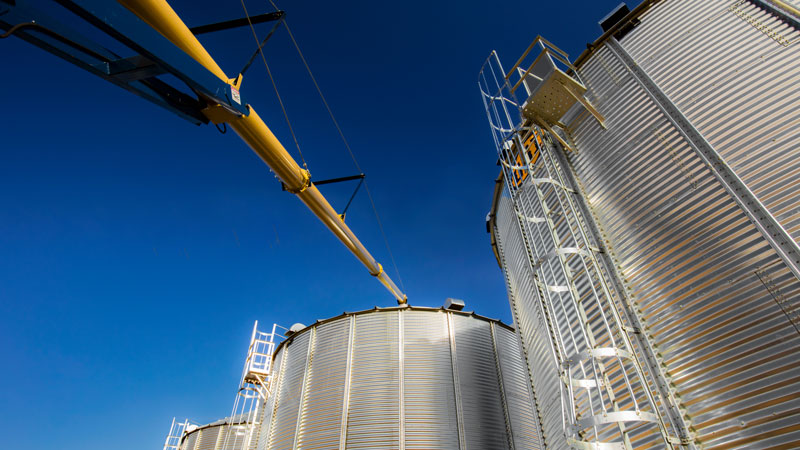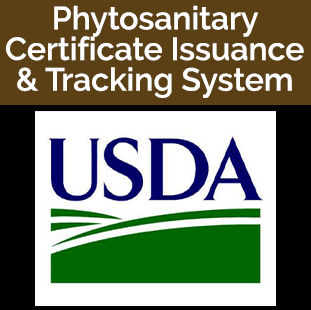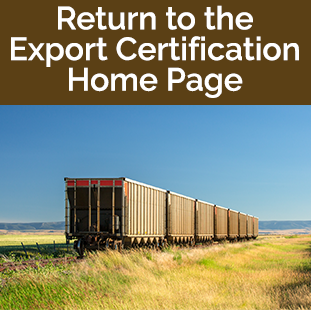Exporting Commodities and Plant Material
Montana Department of Agriculture (MDA) Export Services provides inspection and phytosanitary certification of commodities and plant materials, such as grain, lumber, etc., which many states and most countries require to allow entry.

How can I get a Phytosanitary Certificate to export commodities and plant material?
MDA issues Phytosanitary Certificates for foreign exports through the USDA Phytosanitary Certificate Issuance and Tracking System (PCIT) website. You must create an account in the PCIT site in order to submit an inspection application. MDA services are billed through the PCIT system.
What else should I be aware of if I plan to export commodities and plant material?
States and countries may have quarantine requirements for specific commodities and plant products, and may require testing, treatment or growing season inspections in order to rule out prohibited pests and diseases. Exporters should contact the department (see contact info at the bottom of this page) before a commodity is ready for shipping to determne the phytosanitary requirements for the intended destination.
How much does it cost for inspection services for export certification?
Inspection cost is part of the fee charged for the phytosanitary certificate, as shown below.
Fees
Non-commercial shipment with a value of $1,250 or less = $105
Commercial produce (def. ARM 4.12.1429) shipment
valued at $1,250 and up = $160
Commercial shipment of all other commodities valued at $1,250 and up = $180
All of the above fees also incur an additional $6 USDA fee
Standard Phytosanitary Certificate (PPQ Form 577)
Foreign Phytosanitary Requirements
Each foreign country establishes its own phytosanitary requirements. Information on phytosanitary requirements is available from several sources including:
- USDA-APHIS PExD computer database. Contact the Montana Department of Agriculture to access information from this database: Frank Etzler at (406) 444-9066, email Frank.Etzler@mt.gov; or Carson Thomas at (406) 444-3428, email Carson.Thomas@mt.gov.
- Import Permits – Sometimes, import permits are required by foreign countries. An Import Permit is a special authorization granted by the PLANT PROTECTION SERVICE of a country to allow entry of prohibited plants or plant products and specifies entry requirements for restricted plants or plant products. Import Permits are issued to importers and list specific phytosanitary requirements that must be met. If an import permit is NOT IN ENGLISH, it is the responsibility of the EXPORTER to provide a notarized translation.
Phytosanitary Certificate for Re-Export (PPQ Form 579)
The Phytosanitary Certificate for Reexport, PPQ Form 579, certifies that, based on the original foreign phytosanitary certificate and/or an additional inspection, the plants or plant products officially entered the United States, are considered to conform to the current phytosanitary regulations of the importing country, and have not been subjected to the risk of infestation of infection during storage in the United States.
Additional Information
Using Phytosanitary Certificates as commercial documents is discouraged. Contract requirements, letters of credit, or consular visas are not phytosanitary conditions and are not certified using export certificates. Below are frequently requested statements that may NOT be entered on a phytosanitary certificate:
- Advice Number
- Aflatoxins or other mycotoxins
- Authorization Number
- Fitness for human consumption
- Freedom from animal diseases and statements about animal health concerns
- Grade and/or quality
- Genetic composition and/or disease resistance
- Intended use (such as for scientific purposes)
- Import reference number
- Import tariff item number
- Letter of credit number
- Letter of credit requirements or other unofficial requests from exporters and consignees
- Levels of radioactivity, nuclear radiation, or radionuclides associated with a commodity
- Pesticide or other chemical residues
- Purchase Contract Number
- Reference to artificially propagated or wild collected plants
- Any other requested statement that is not of a phytosanitary nature, such as economic permits, quantity or quality restrictions, or methods of packaging
No Changes Allowed
Exporters may NOT make any changes or corrections to a certificate. If a change is required it may only be made by a certifying official.
Original Phytosanitary Certificates Required
The original phytosanitary certificate must be presented to the plant quarantine officials in the foreign country. Photocopies are NOT acceptable, although customs officials may retain copies.
Privacy
Certifying officials hold in strict confidence the information in these documents (PPQ Forms 577, and 579 as well as application forms) to protect buyers and exporters. The Freedom of Information Act disallows the release of trade secrets or confidential commercial or financial information (Title 5, USC Section 552 and 552(b)(4)).


